| Srl | Item |
| 1 |
ID:
096220
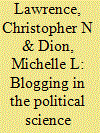

|
|
|
|
|
| Publication |
2010.
|
| Summary/Abstract |
Weblogs (or blogs), as a form of communication on the Internet, have recently risen in prominence but may be poorly understood by both faculty and students. This article explains how blogs differ from other online communication tools and how political science faculty can make use of blogs in their classes. The focus is on using blogs as part of class assignments to reinforce important skills, including critical thinking, political engagement, and essay writing. We also discuss existing academic and professional blogs that may be models for student blogging in political science.
|
|
|
|
|
|
|
|
|
|
|
|
|
|
|
|
| 2 |
ID:
186717
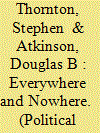

|
|
|
|
|
| Summary/Abstract |
Recent research suggests that many faculty members believe that their students are lacking the information literacy (IL) skills needed to be successful in their college career. Reports also suggest that there is a broader issue about the uncertain position of IL in the university curriculum. This article uses data from a worldwide survey of political science faculty to better understand how widespread this perception is, what is being done about this perceived problem, and what steps can be taken to encourage faculty to implement IL training in the classroom. We find that faculty believe that there is a problem but many are not explicitly teaching IL as part of their courses. We also find that faculty members who have received IL training are far more likely to include it in their courses. This leads us to suggest that IL training should be provided at the faculty level, which will have positive downstream effects on the IL training that students receive. We also contend that IL deserves a more prominent place in the university curriculum.
|
|
|
|
|
|
|
|
|
|
|
|
|
|
|
|
| 3 |
ID:
175303
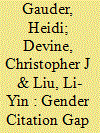

|
|
|
|
|
| Summary/Abstract |
Previous studies documented a “gender citation gap” in political science whereby women are less likely to be cited in published research and course syllabi, especially by male scholars. However, no previous study examined citation patterns among students in political science courses to determine if similar patterns are evident in their research. This article analyzes an original database of individual as well as group research assignments from an undergraduate research methods course. Our analysis indicates that male students are significantly less likely than female students to cite research published by women—whether as first authors, any of the authors, or the average percentage of authors per team. However, in a subsequent group research assignment, gender diversity had no discernible effect on group citation patterns. We discuss the implications of these findings for current pedagogical practices and the future state of the discipline.
|
|
|
|
|
|
|
|
|
|
|
|
|
|
|
|
| 4 |
ID:
110665
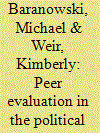

|
|
|
|
|
| Publication |
2011.
|
| Summary/Abstract |
When student presentations are offered in the classroom, instructors are most likely to be concerned about the extent to which students pay attention and learn from the experience of not only giving a presentation, but about what students learn as an audience. After devising a peer-evaluation instrument for students to evaluate their classmates' presentations, over the course of two years and 10 courses, we surveyed students to determine the effectiveness and usefulness of peer evaluations. We found that students are more likely to pay attention, gain a different perspective on the presentation experience, and be more engaged in the presentation when they evaluate one another.
|
|
|
|
|
|
|
|
|
|
|
|
|
|
|
|
| 5 |
ID:
160333
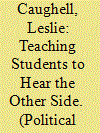

|
|
|
|
|
| Summary/Abstract |
Research suggests that technology in the political science classroom may enhance student experiences and help instructors achieve their student-learning outcomes. Yet, how technology may foster more empathy for opposing viewpoints—an essential characteristic of deliberative democracy—has received less attention. This article outlines an assignment that required students to use WordPress to construct a campaign website for an opposition candidate and write a paper justifying their content and design choices. After completing this assignment, students demonstrated increased knowledge of the candidates for whom they designed websites. Additionally, they displayed a greater level of confidence in the competence of those candidates and a greater understanding of why the candidates would appeal to certain voters. Students also expressed a belief that the assignment provided a tangible professional skill that they would use in the future, and they indicated that their belief in the demonstrated utility of the assignment made it more enjoyable and engaging. This assignment provides one example of how technology may be used in the political science classroom in a way that facilitates student engagement and democratic citizenship, while also helping the instructor to gauge students’ ability to apply course content to contemporary events.
|
|
|
|
|
|
|
|
|
|
|
|
|
|
|
|